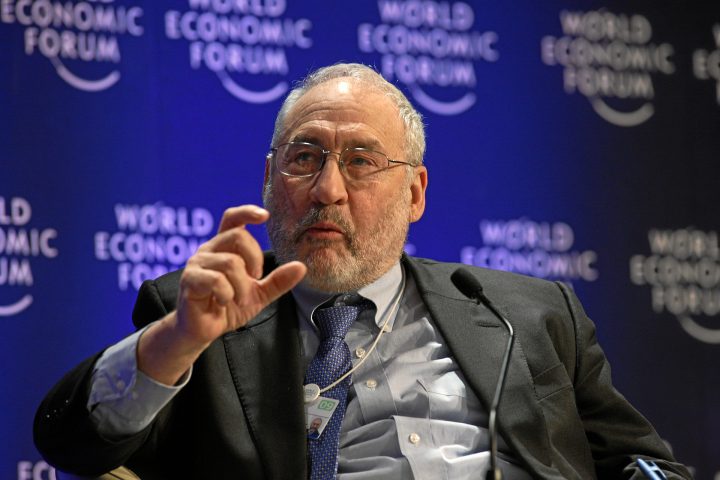Joseph Stiglitz is an American economist who received the Nobel Prize in Economics in 2001. He is a former senior vice president and chief economist of the World Bank. In recent years he has been a harsh critic of globalised neoliberalism, which he calls “free market fundamentalism”, and of international institutions such as the International Monetary Fund and the World Bank. Not bad for a system insider.
His unmissable recent piece on this subject published by The Guardian describes in no uncertain terms how: “Decades of free-market orthodoxy have taken a toll on democracy:
“After 40 years of neoliberalism, the verdict is in – the fruits of growth went to the few at the top. The credibility of neoliberalism’s faith in unfettered markets as the surest road to shared prosperity is on life-support these days. And well it should be. The simultaneous waning of confidence in neoliberalism and in democracy is no coincidence or mere correlation. Neoliberalism has undermined democracy for 40 years.
‘The form of globalisation prescribed by neoliberalism left individuals and entire societies unable to control an important part of their own destiny, as Dani Rodrik of Harvard University has explained so clearly, and as I argue in my recent books Globalization and Its Discontents Revisited and People, Power, and Profits. The effects of capital-market liberalisation were particularly odious: if a leading presidential candidate in an emerging market lost favour with Wall Street, the banks would pull their money out of the country. “Voters then faced a stark choice: give in to Wall Street or face a severe financial crisis. It was as if Wall Street had more political power than the country’s citizens.
“Even in rich countries, ordinary citizens were told: “You can’t pursue the policies you want” – whether adequate social protection, decent wages, progressive taxation, or a well-regulated financial system – “because the country will lose competitiveness, jobs will disappear, and you will suffer”.
Now he has given his blessing to the choice of Economy Minister by the new Argentinian Government headed by Alberto Fernandez. Acknowledging the disastrous Macri Government/IMF interaction he writes: “Argentina chooses right man at right time to reignite the economy.
‘Martín Guzmán is a leading expert on sovereign debt and the problems it can cause.
“When the former president Mauricio Macri took office, his economic team openly admitted that while they had inherited many problems, they started with one major advantage: a low level of debt. They gambled on a set of policies – making, for instance, untimely and unnecessarily large cuts in export taxes, paying off old, defaulted debt to so-called vulture funds with unconscionably high returns, and taking on new high-interest, long-term, dollar-denominated debt, all in the hope that market-friendly signals would lead to a rush of growth-spurring foreign investment. Even at the time I thought it was a foolhardy gamble.
“The rest is history. It didn’t work out and as matters went from bad to worse, Macri compounded the mistakes. More borrowing, including a $57bn programme with the International Monetary Fund. Austerity. Misguided sterilisation efforts to prevent inflation, which built up a debt overhang. The worst of all possible worlds was soon at hand: more inflation (reaching almost 60% in the current year), higher unemployment (already at double digits and rising) and the re-imposition of the exchange controls, the removal of which Macri had lauded at the outset of his administration as the cornerstone of his economic policy.
“As Fernández has put it, one doesn’t solve a problem of excessive debt by taking on more debt
“As a result, Fernández inherits a far worse economic situation than Macri confronted: higher inflation, higher unemployment and now, a debt beyond Argentina’s ability to service. Doubling down on a failed policy will not work; nor will returning to what preceded it. That is why it is so important that Fernández has appointed a knowledgeable, brilliant economist who combines youthful energy with a wisdom well beyond his 37 years.”
Stiglitz is less vocal about the way most of the money lent to the Macri Government went not to treat the country’s structural problems but to the usual corrupt members of the administration and many international investors taking advantage of now well established bizarre high returns which have dominated Argentina’s economy for many years. But his positive view of the new Economy Minister, who he knows personally and has worked with, opens interesting possibilities of solid advice.
It is not a matter of idealising the new government. Problems may arise from its mixed bag of new appointees, as shown before. And the old enemies, the right wing media and US foreign policies towards progressive Latin American governments, will no doubt reappear with renewed energy.
But let´s hope that Stiglitz and Co, if they are prepared to give a hand, realise that the boom/bust cycles of the country are not “accidents” but a well planned strategy on a country that has been proven able to recover from each crisis of stolen wealth and has produced more wealth during progressive governments, at which point the kleptocrats ready themselves for another cycle of stealing and dehumanising social policies. How to break this cycle will need both a good local strategy and some international support.










